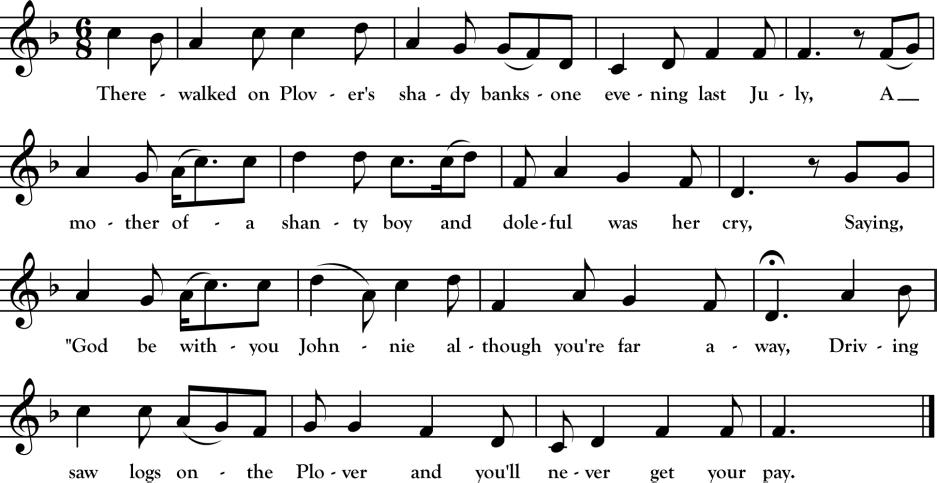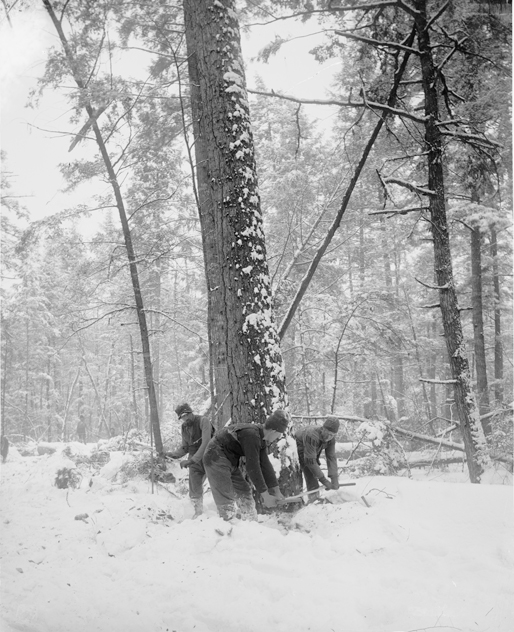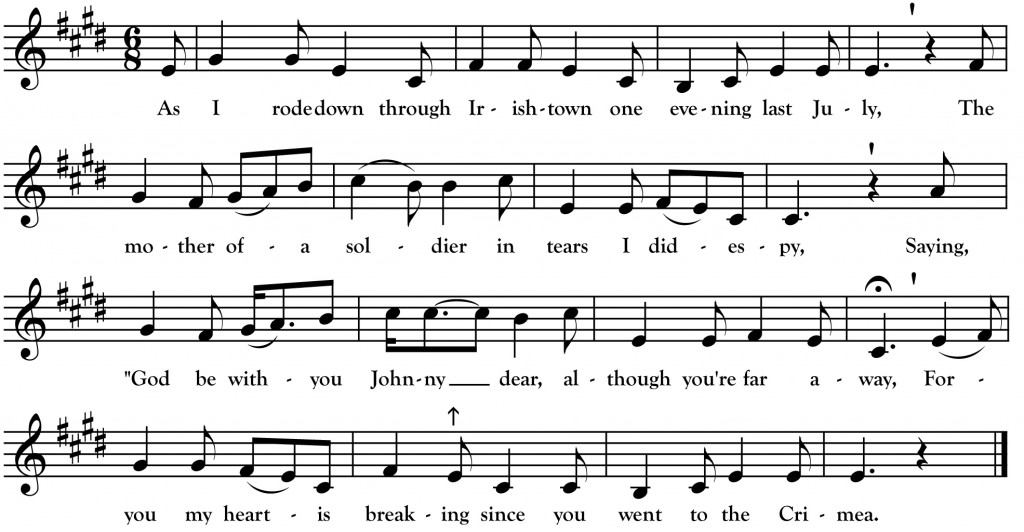Driving Saw Logs on the Plover

There walked on Plover’s shady banks one evening last July,
A mother of a shanty-boy, and doleful was her cry,
Saying, “God be with you, Johnnie, although you’re far away,
Driving saw-logs on the Plover, and you’ll never get your pay.
“Oh, Johnnie, I gave you schooling, I gave you a trade likewise.
You need not been a shanty-boy had you taken my advice.
You need not gone from your dear home to the forest far away,
Driving saw-logs on the Plover, and you’ll never get your pay.
“Why didn’t you stay upon the farm and feed the ducks and hens,
And drive the pigs and sheep each night and put them in their pens?
Far better for you to help your dad to cut his corn and hay,
Than to drive saw-logs on the Plover, and you’ll never get your pay.”
A log canoe came floating a-down the quiet stream.
As peacefully it glided as some young lover’s dream.
A youth crept out upon the bank and thus to her did say,
“Dear mother, I have jumped the game and I haven’t got my pay.
“The boys called me a sucker and a son-of-a-gun to boot.
I said to myself, O Johnnie, it is time for you to scoot.’
I stole a canoe and I started upon my weary way,
And now I have got home again — but nary a cent of pay.”
Now all young men take this advice: If e’er you wish to roam,
Be sure and kiss your mothers before you leave your home.
You had better work upon a farm for a half a dollar a day,
Than to drive saw-logs on the Plover, and you’ll never get your pay.
This month we have a rare instance of an old traditional song where we know the identity of its composer. “Driving Saw-Logs on the Plover” was written in 1873 by William Allen of Wausau, Wisconsin. William Bartlett, a local historian in Eau Claire, Wisconsin, knew Allen personally and connected him with song collector Franz Rickaby in the early 1920s. Thanks to notes and documents saved by Bartlett and Rickaby we know a lot about Allen, who put some of his songs out under the pseudonym “Shan T. Boy.”
Allen was born in 1843 in St. Stephen, New Brunswick just across the river from Calais, Maine. His parents were both immigrants from Ireland. The family moved to the western shores of Lake Michigan in 1855 where they lived first in Cedar River, Michigan in the Upper Peninsula and then Manitowoc, Wisconsin before heading inland to Wausau. After apprenticing with a timber cruiser near Green Bay, Allen returned to Wausau in 1868 (age 25) to begin a long career as a cruiser himself. Cruisers would roam the woods estimating the quantity and quality of trees for harvesting.
Allen’s work as a cruiser provided a context for singing and song writing. In a letter to Bartlett, he wrote “I had occasion to visit a great many logging camps in the course of each winter, and it was customary for me to sing for the lumber-jacks in lumber-jack style… …Several of my poems are sarcastic descriptions of characters and failings of our respectable (?) citizens, and I have been threatened with libel suits and shot-guns on several occasions.” “Driving Saw-Logs on the Plover” does not name any particular crooked boss but it certainly paints a grim picture of a shanty boy who, after enduring the labor and danger of a log drive, realizes his employer has no intention of paying him.
Allen based the song text and melody on a popular broadside ballad called “The Crimean War” or “As I Rode Down Through Irishtown” (see Northwoods Songs #10). It is a well worn melody in the Irish tradition. Ontario singer Bob McMahon had a nice twist on it when he sang it for Edith Fowke in 1959. I have blended McMahon’s melody with the melody and text given by Allen to Rickaby here.



